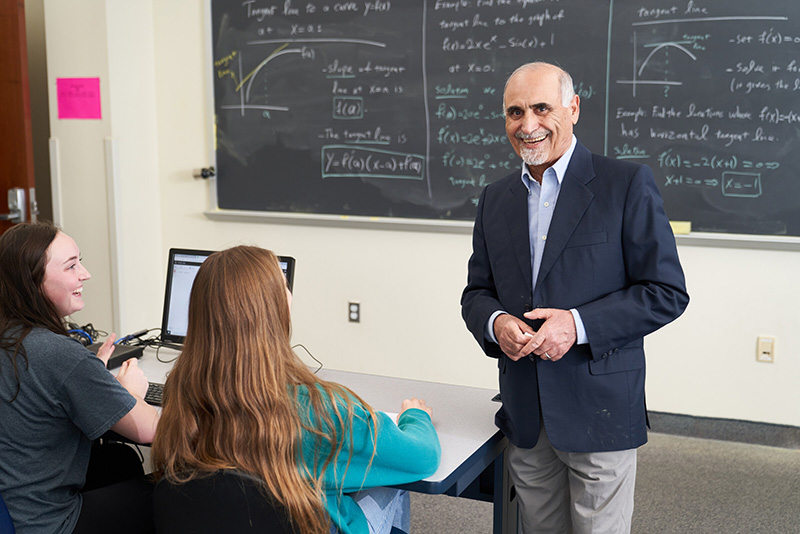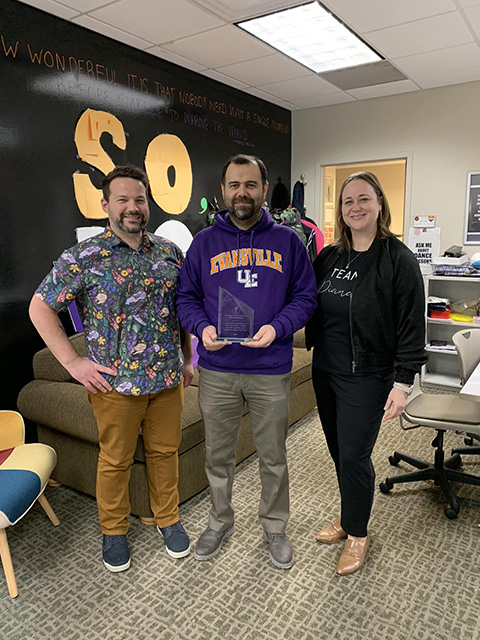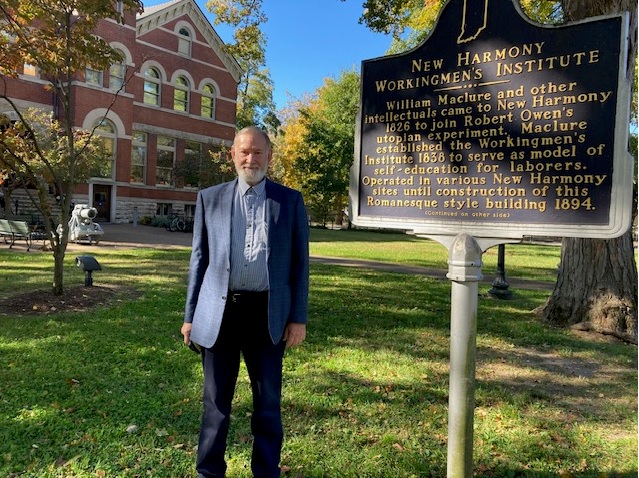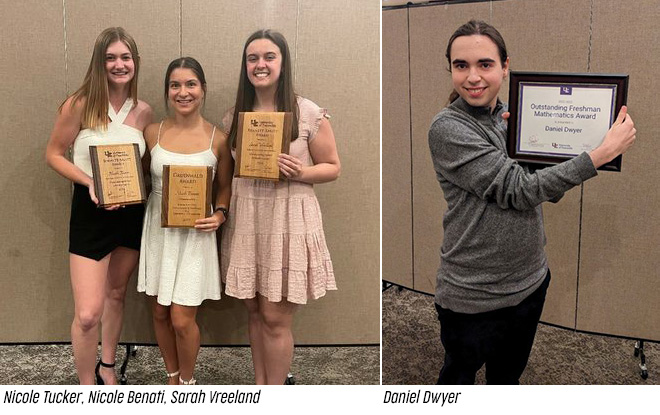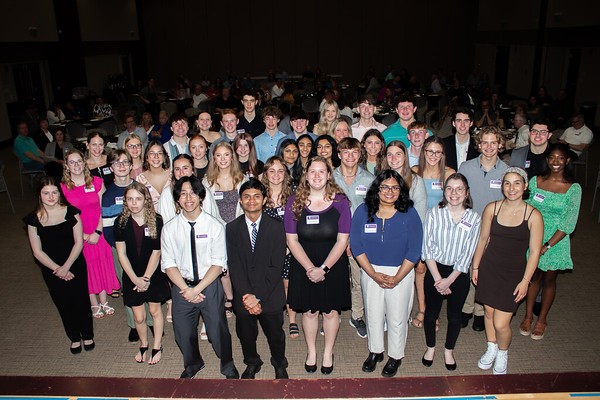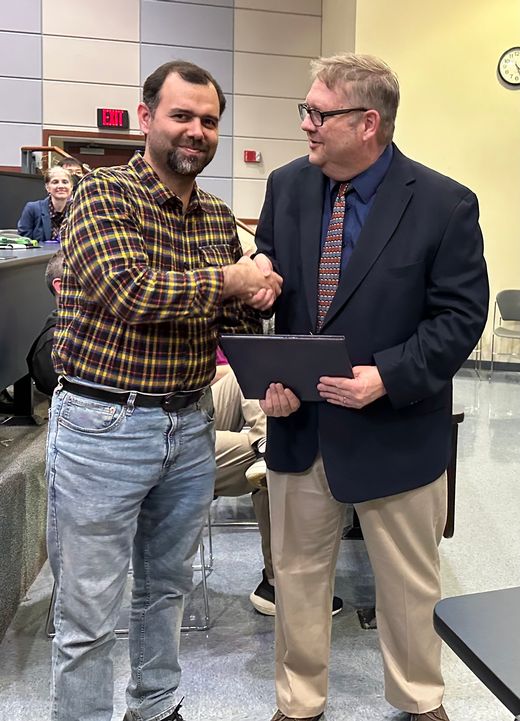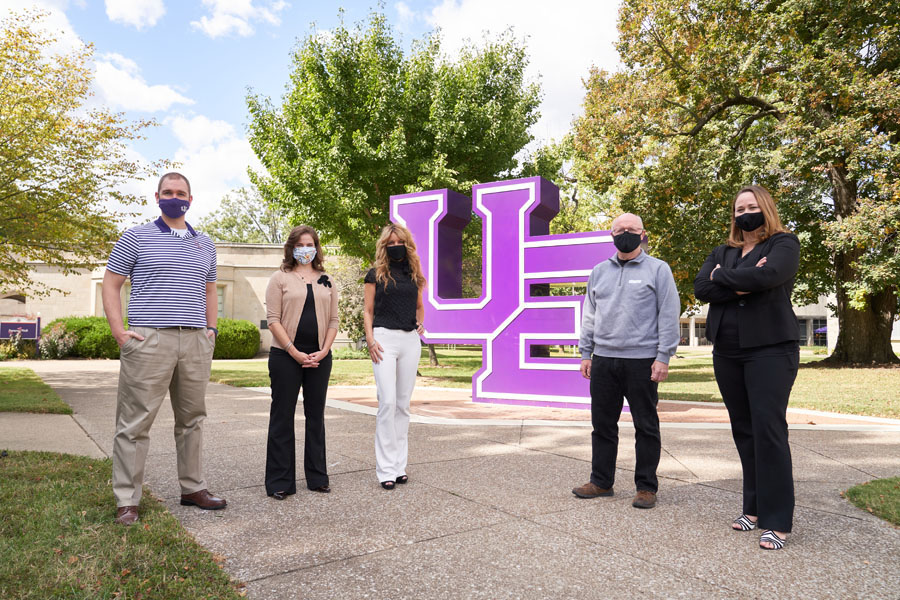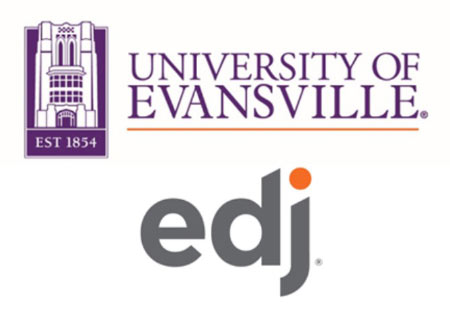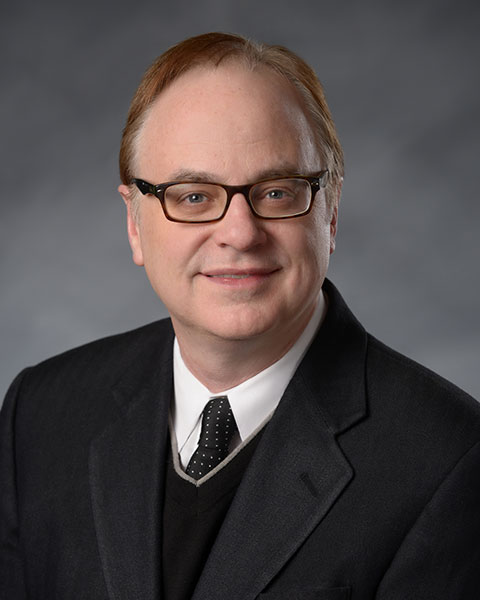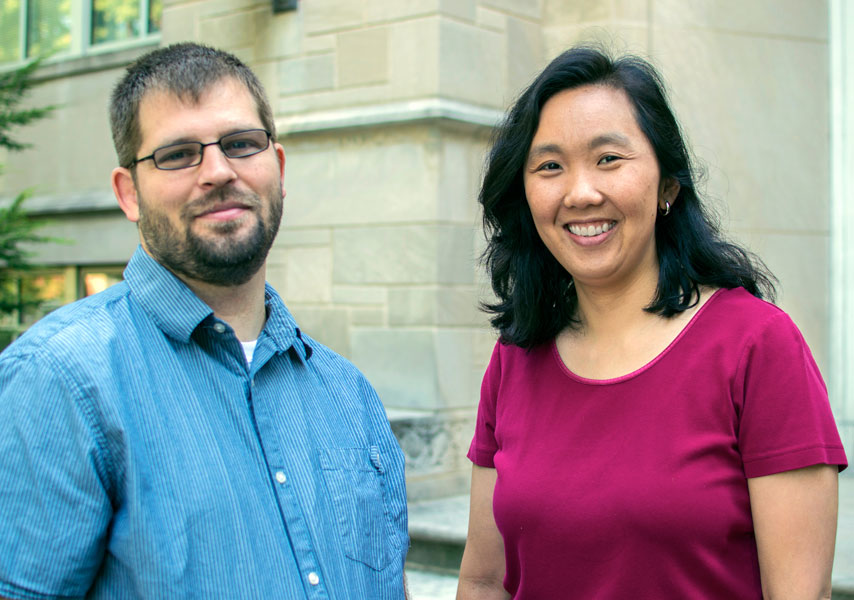News
UE Professor Makes History as the First Muslim to Have Two Prestigious Mathematics Awards Named in His Honor
Posted: April 10, 2025
The University of Evansville (UE) proudly announces that Professor Mohammad K. Azarian has made history as the first Muslim and the first Iranian American mathematician to have two prestigious mathematics awards named in his honor by the American Mathematical Society (AMS) and the Mathematical Association of America (MAA).
These honors, established under his name, recognize his outstanding contributions to research, problem creation, and his unparalleled service to the mathematics community.
His extensive academic work includes the publication of 47 papers, 87 problems, and over 60 presentations at international, national, and reginal meetings and conferences. Professor Azarian served four years as a Discipline Peer Reviewer for the Fulbright Scholar Program (2015-2018) and published 78 reviews in the AMS's Mathematical Reviews (MathSciNet) and the European Mathematical Society's zbMATH Open (Zentralblatt MATH).
The Mohammad K. Azarian Prize for Mathematical Reviews Reviewers, established by AMS, honors mathematicians who have demonstrated exceptional contributions to the peer review field. This prize will recognize notable achievement by peer reviewers, past, present, and future. By providing quality reviews of scholarly articles, reviewers provide a vital link for researchers between established research and works in progress. The inaugural award will be presented at the Joint Mathematics Meetings in Washington, D.C., in January 2026, when AMS and 16 other mathematics organizations will gather for their joint annual meeting.
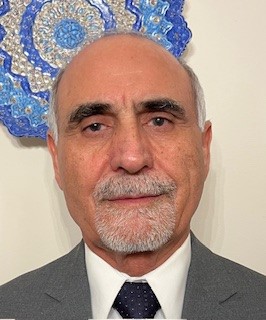
Professor Azarian, a lifetime member of the AMS since 1983, has been an active force in the mathematical community for decades. His contributions include serving on the Human Rights of Mathematicians Committee and chairing the committee in 2023. Additionally, he has represented AMS on the American Association for the Advancement of Science Human Rights Coalition.
Similarly, the Mohammad K. Azarian Scholar Award, established by MAA, celebrates excellence in mathematical problem creation. This award recognizes individuals whose original, thought-provoking problems challenge and inspire the mathematical community.
Honorees will be selected from contributors to MAA publicationsThe American Mathematical Monthly, Mathematics Magazine, The College Mathematics Journal, and Math Horizons-as well as from problem creators featured in the American Mathematics Competitions (AMC), American Invitational Mathematics Examination (AIME), the Putnam Competition, and the Mathematical Olympiad Program (MOP). By spotlighting outstanding problem creators, this award reinforces the vital role of problem-creation in advancing mathematical thinking and education. The inaugural award will be presented in August at MathFest 2025, in Sacramento, California. Professor Azarian will be a speaker at this conference.
Professor Azarian has been a member of MAA since 1986, with a distinguished record of service. His numerous contributions include serving on the Executive Board of the Indiana Section of the MAA (2001-2007), where one of his responsibilities was overseeing the Indiana College Mathematics Competitions for all of Indiana's colleges and universities. He was honored with the Mathematical Association of America-Indiana Distinguished Service Award in 2017.
With these two honors, Professor Azarian becomes the first Muslim, the first Iranian American, and the third mathematician to have two distinguished mathematics awards named in his honor by AMS and MAA, the two largest, oldest, and most respected mathematics organizations in the United States. These recognitions underscore his lasting impact on mathematical scholarship and problem creation.
The University of Evansville congratulates Professor Azarian on this remarkable achievement and looks forward to celebrating his contributions to the global mathematical community.
To learn more about Professor Azarian's scholarly work, please visit faculty.evansville.edu/ma3/
ChangeLab Class Awarded an Honorable Mention at Intermediate Statistics Class Project Competition
Posted: April 4, 2025
A student team from Dr. Omid Khormali’s Fall 2024 ChangeLab class has been awarded an Honorable Mention in the December 2024 Intermediate Statistics Class Project Competition, hosted by the American Statistical Association (ASA) and the Consortium for Advancement of Undergraduate Statistics Education (CAUSE).
The project, titled “Developing A User-Friendly Shiny Application For Visualizing And Comparing United States Crop Data Procured By NASS”, was completed under Khormali’s mentorship by students Andrew Thompson, Ethan John, Abigal Jahn, Josephine Pagano, and Max Hansmann.
The link for their winner webpage is:
https://www.causeweb.org/usproc/usclap/2024/fall/winners
This recognition came amidst strong national competition, and it highlights both the quality of the students' work and the real-world impact of our ChangeLab model, which integrates applied data science with community-oriented research.
Students Present at 2025 Rose-Hulman Undergraduate Mathematics Conference
Posted: April 2, 2025
Three students presented their work at the 2025 Rose-Hulman Undergraduate Mathematics Conference. Dr. Omid Khormali supervised both projects.
Madelyn Tarvin & Olivia Oliver presented “Developing a Shiny App to Enhance Food Accessibility for Urban Seeds’ Nourish Program”.
🎥 Watch their presentation here: https://www.youtube.com/watch?v=qxbfuqpLtB0
Alexander Bastien presented “Some Results on Link-Irregular Graphs”
🎥 Watch his presentation here: https://www.youtube.com/watch?v=sN0IkQcnaas
📄 Read the full paper on arXiv https://arxiv.org/abs/2503.21916
Students from 14 Southwest Indiana High Schools to be Honored by UE's Mathematics Department
Posted: April 9, 2024
Students from 14 Southwestern Indiana High Schools will be honored during the 31st Annual Mathematics Department Banquet on Thursday, April 11 at the University of Evansville (UE).
The top performing High School junior students will be recognized for their hard work. Students will also be awarded a special add-on scholarship. The schools participating included Boonville High School, Bosse High School, Castle High School, Central High School, Evansville Christian School, Gibson Southern High School, Mater Dei High School, Mt. Vernon High School, New Tech Institute, North High School, North Posey High School, Reitz High School, Reitz Memorial High School, and Signature School.
A room of over 150 people will be on hand for the annual celebration in Eykamp Hall at the University's Ridgway Center. Keynote speaker and UE alumnus Alan Vandagriff '14 will present on "Why I'm glad I studied math." Professor of Mathematics Dr. Clark Kimberling , UE President Christopher Pietruszkiewicz, and Senior Associate Director of Admission Heather Cook will also speak to the audience.
"At our annual mathematics banquet, we celebrate the brilliance of these students' minds and talents," remarked Dr. Erin Davis, Associate Professor and Department Chair of Mathematics. "Their passion and commitment serve as a testament to the boundless potential fueled by curiosity and a passion for learning. We are grateful for their attendance and the joy they bring to this yearly event."
Professor Publishes Biographical Work Unveiling the Legacy of Josephine Mirabella Ellio
Posted: March 6, 2024
University of Evansville professor of mathematics, Clark Kimberling, proudly announces the publication of his latest work, "Josephine Mirabella Elliott: Historian, Librarian, Teacher." This biographical masterpiece delves into the remarkable life of Josephine Mirabella Elliott, a figure celebrated for her extensive research and publications focusing on the rich history of New Harmony, situated just 25 miles west of Evansville.
A highlight of Josephine Mirabella Elliott's scholarly endeavors includes her monumental 1200-page book, "Partners for Posterity," published by the Indiana Historical Society in 1994. Her profound dedication to recording the historical narrative of New Harmony received widespread recognition, with her works being consistently featured in Evansville and Posey County newspapers until her passing in 2002.
Josephine Mirabella Elliott, born in 1912 to Italian parents in Chicago, pursued her education at the University of Chicago High School before earning two degrees at the University of Chicago. There, she met her future husband, John Elliott, an archaeologist who later became a civic leader. After World War II, John inherited a farm in New Harmony, sparking their deep involvement in the town's history and their lasting impact on the University of Southern Indiana (USI). Their significant contributions earned them honorary doctorates from USI, recognizing their influence on academia and local communities.
The narrative is enriched by rare insights, including a captivating picture capturing the faculty of Bosse High School in Evansville, IN, circa 1945. The biographical account draws extensively from the correspondence between Josephine and John Elliott, archived at the renowned Working Men's Institute Library in New Harmony, where Josephine made significant contributions throughout her career.
Professor Clark Kimberling's careful research and compelling narrative showcase the extraordinary life of Josephine Mirabella Elliott, shedding light on her enduring legacy as a trailblazer in historical preservation and education.
Dr. Omid Khormali is the Emerging ChangeLab Coach of the Year!
Posted: February 23, 2024
Here’s what the Center for Innovation & Change members had to say about our standout leader.
“Designed to recognize a Coach who jumps right in to deliver high impact experiential learning for ChangeLab students, Dr. Khormali’s Data Analysis students have blown us away. They’ve helped a wide range of clients gain key insights and make better decisions, including the U.S. Forest Service. For which Dr. Khormali’s team analyzed more data than the Lunar Lander, and provided a way for the USFS to better understand invasive species and forest fire issues. There’s a good chance his students will get to testify in front of Congress about it and begin assisting other municipal entities due to a successful grant the work has inspired. Considering their program’s last ChangeLab won the National Excellence in Innovation award at the Edward R. Murrows, UE’s Math Department is not playing around! Congratulations, Omid!”
Professor Azarian Speaks at National Mathematics Conference and Presides Over the Human Rights Meeting
Posted: January 22, 2024
Mohammad K. Azarian, professor of mathematics, attended the 2024 Joint Mathematics Meetings in San Fransisco, California, January 2-6, where 17 different national mathematics organizations took part. He presented a paper to the American Mathematical Society (AMS) entitled, “Combinatorics of Discrete Functions”. Also, as the chair of the AMS Committee on the Human Rights of Mathematicians, he presided over its annual meeting.
Professor Azarian Speaks at the National Meeting of the Mathematical Association of America (MathFest 2023)
Posted: November 13, 2023
Mohammad K. Azarian, Professor of Mathematics, presented a paper entitled, "Strategies and Challenges in Creating Original, Interesting, and Publishable Mathematical Problems" at the National Meeting of the Mathematical Association of America in Tampa, Florida, August 2-5, 2023. Also, he co-chaired the contributed paper session, "Problem Creation and Problem Solving" which he co-organized. He also served as a judge for undergraduate poster session, sponsored by MAA.
Clark Kimberling Gives Presentation at 50th annual conference of the Communal Studies Association
Posted: October 23, 2023
UE Professor of Mathematics Clark Kimberling gave an invited presentation at the 50th annual conference of the Communal Studies Association, October 3-7 in New Harmony, Indiana.
In a session on early 19th century New Harmony, Kimberling used his recently published website, CORNELIUS TIEBOUT ENGRAVINGS as a basis for describing the life and work of one of America's foremost copperplate engravers. While still a teenager, Tiebout engraved a map of Manhattan in the New York City Directory for 1789, as well as 47 engravings in The New York Magazine and Literary Repository. During 1793-1796, Tiebout worked in London, and in 1800, he and his bride Esther moved from New York to Philadelphia, where hundreds of his engravings were published. In 1826 he (with daughter Caroline, 23, and son Henry, 5), moved to New Harmony, where he joined other famous Philadelphians (William Maclure, Thomas Say, Charles-Alexandre Lesueur, and Marie Fretageot). There he continued engraving, and he was a teacher in Maclure's School of Industry until his death in 1832. Dr. Kimberling also recently expanded his website New Harmony Scientists, Educators, Writers & Artists and contributed to Wikipedia its article on Cornelius Tiebout.
Mathematics Award Recipients
Posted: May 17, 2023
Congratulations to this year’s Mathematics Award recipients!
The Bennett-Knott Outstanding Senior in Mathematics Award recipients are Nicole Tucker and Sarah Vreeland. The Gruenwald Commitment to Excellence award was presented to Nicole Benati. The Outstanding Freshman Mathematics award recipient is Daniel Dwyer.
Students from 13 Southwest Indiana High Schools Honored by UE’s Mathematics Department
Posted: April 6, 2023
Students from 13 Southwestern Indiana High Schools were honored during the 30th Annual Mathematics Department Banquet on Tuesday, April 4, at the University of Evansville (UE).
The top performing High School junior students were recognized for their hard work. Students were awarded a special add-on scholarship. The schools participating included Boonville High School, Bosse High School, Castle High School, Central High School, Gibson Southern High School, Mater Dei High School, Mt. Vernon High School, New Tech Institute, North High School, North Posey high School, Reitz High School, Reitz Memorial high School, and Signature School.
A room of 150 people were on hand for the annual celebration in Eykamp Hall of the University's Ridgway Center. Keynote Speaker and Data Scientist Dr. Darrin Weber presented on "What is data science and why does it need mathematicians?" Professor of Mathematics Dr. Clark Kimberling and Vice President for Enrollment and Marketing Dr. Jill Griffin also spoke to audience members.
"We must take a moment to express our gratitude for all the young minds who gathered at UE on Tuesday night, their passion for mathematics inspires us all," said Associate Professor and Department Chair of Mathematics Dr. Erin Davis. "Their enthusiasm and dedication remind us of the power of curiosity and the endless possibilities that come with a love for learning. We are thankful for their presence and for the joy they bring to this annual math banquet."
Congratulations to Data Analytics ChangeLab Participants
Posted: March 27, 2023
Congratulations to the Data Analytics ChangeLab for winning an award during the 28th annual Celebration of Leadership, hosted by Leadership Everyone.
Celebration of Leadership is an annual event during which Leadership Everyone honors individuals, projects, programs, businesses, and organizations that make significant, collaborative contributions that improve and transform community in the Tri-State region. The Department of Mathematics' STAT 300 ChangeLab students were honored for their project with the U.S. Forestry Service.
Dr. Omid Khormali Receives Class of 1961 Faculty Fellowship Award
Posted: March 24, 2023
UE, WNIN Receive National Edward R. Murrow Award
Posted: August 17, 2021
On Tuesday, August 17, the Radio Television Digital News Association announced the University of Evansville (UE) and WNIN as a national winner for the 2021 Edward R. Murrow Awards.
In 2020, WNIN, the Center for Innovation and Change at the University of Evansville, and ¿Qué Pasa, Midwest? collaborated on a seven-month research and reporting project to find stories of the coronavirus pandemic in seven Midwestern states. COVID Between the Coasts (CBC) is ongoing, adding data-driven reporting on the pandemic for the historical record.
CBC Lead Reporter Sarah Kuper said, “The students' hard work and valuable points of view, combined with the expertise of Dr. Tamara Wandel and Dr. Darrin Weber, made COVID Between the Coasts a historic time capsule of Midwestern life during the pandemic. It was their contribution that put us in the position to win one of the highest honors in the field of journalism. I know I personally learned a lot by working with them.”
WNIN Vice President of Radio Steve Burger said, “Because of the UE data and research, we were able to focus our coverage within a large survey area and break new ground. For example, our ¿Qué Pasa, Midwest? team on the ground in Chicago did valuable reporting on inconsistencies in the national data regarding essential workers. We reported on rural Midwestern communities that previously were not part of the national discussion of the pandemic. We showed the differences in the pandemic’s impact across our survey area.”
“UE is proud to have been part of telling the story of our Midwestern region in the first pandemic in 100 years and highlights the significant contributions that our faculty, staff, and students make every day in our ever-changing world,” said UE President Christopher M. Pietruszkiewicz. “With UE and WNIN working together, we were able to make a difference in a way that we would not have been able to do individually and are delighted by the collaboration.
Since 1971, the Radio Television Digital News Association has honored outstanding achievements in electronic journalism with the annual Edward R. Murrow Awards. These awards are among the most prestigious in broadcast news, and recipients demonstrate the spirit of excellence that Murrow set as a standard for the profession of electronic journalism. Winners will be honored at the Murrow Awards Gala in New York City on October 27, 2021.
University of Evansville Students Earn Prestigious Edward R. Murrow Awards
Posted: June 11, 2021
A group of University of Evansville (UE) students have been recognized for their work on a community journalism initiative that examines the impact of the COVID-19 pandemic on the Midwest.
The UE ChangeLab project, “COVID Between the Coasts,” is a collaboration between two University courses and National Public Radio member station WNIN.
The project, presented in a podcast format, examined seven Midwestern states through the lens of underrepresented populations grappling with the ongoing pandemic.
Over seven months, Aces led by Drs. Tamara Wandel (communications) and Darrin Weber (mathematics) carried out research, conducted interviews, and compiled data to tell localized and human stories.
“The research and reporting for our podcast is broader and richer as a result of the ChangeLab students’ award-winning work,” said WNIN reporter and producer Sarah Kuper.
“COVID Between the Coasts” earned the Excellence and Innovation and Excellence in Writing in the Region 7 group at the 2021 Edward R. Murrow Awards. Since 1971, the Radio Television Digital News Association has honored outstanding achievements in electronic journalism with annual ceremonies.
“These are some of the most prestigious journalism awards out there, and I’m so proud of our students for their work on this project,” Wandel said.
“My classmates and I were able to do everything from research to interviewing and script writing,” UE student Nicole Tucker. “These were all things that we didn’t have a lot of experience in but with the help of our professors and WNIN, we were able to create a successful podcast series.”
A compilation of “COVID Between the Coasts” is available online.
ChangeLabs at the University of Evansville are semester-long courses in which students create positive change for businesses, nonprofits, and the community. Guided by expert coaches, multidisciplinary student teams provide services or develop innovative solutions to challenges. In addition to the award-winning “COVID Between the Coasts” collaboration, other ChangeLab projects include a city-wide bike sharing program and a $90,000 solar panel grant for a local community center.
For more information, visit the ChangeLab webpage.
University of Evansville Ranked Among the Top 20 Most Affordable Bachelor's in Data Science
Posted: June 1, 2020
The University of Evansville has been ranked among the top 20 most affordable bachelor's in data science for 2020 by Data Science Degree Programs Guide. The ranking was published on the organization's website in January.
This ranking was created using the National Center for Education Statistics' College Navigator database. The top 20 most affordable bachelor's in data science programs were selected based on the program's net price.
“The University of Evansville is deeply committed to both academic excellence and affordability,” said Dave Dwyer, chair of the Department of Mathematics at UE. “I’m proud of the extraordinary work of our faculty, students, and alumni in building an elite program in statistics and data science while maintaining affordability. Our inclusion in this ranking is a testament to their efforts.”
The bachelor's in statistics and data science from the University of Evansville combines cutting-edge data science techniques with statistics. Students get a top-notch liberal arts education that prepares them to frame questions, work as part of a team, make decisions, and communicate results.
Emphasis is placed on analyzing real-world data using statistical methods with software like R, Python, and SQL. Courses include Machine Learning, Techniques for Large Data Sets, and Statistical Modeling, as well as a data consultancy.
“Our students have an opportunity to work as data consultants for local businesses and organizations that give them on-the-job experience you can’t get anywhere else,” said Darrin Weber, assistant professor and director of the Statistics and Data Science program. “This gives them the type of experience employers are looking for from experienced professionals, and our students have it before they graduate.”
Most students complete their data science degree along with minor or even a second major in four years. Visit the program’s web page to learn more.
Data Science Degree Programs Guide is an online resource guide for finding the latest information about data science programs available at the associate's, bachelor's, and master's degree levels. The site's mission is to share expert knowledge on the highest quality data science degree programs offered by accredited universities to help students in their quest for a rewarding career in data science. Comprehensive resources include program rankings, feature articles, scholarship information, and more. Read the full article online.
Kimberling and Moses Publish Research Paper
Posted: April 15, 2020
Professor of Mathematics Clark Kimberling and British engineer Peter Moses have a research article on "Self-inverse Gemini triangles" in the April issue of the International Journal of Geometry. The article investigates special properties of a large family of triangles known as Gemini triangles.
Using methods of linear algebra applied to barycentric coordinates, the conclusions involve several conic curves and cubic curves that are new to the literature. Several recently discovered special points in the plane of a triangle are introduced, having first appeared during 2019 in the UE-based Encyclopedia of Triangle Centers (https://faculty.evansville.edu/ck6/encyclopedia/ETC.html).
A pdf of the paper can be accessed from https://ijgeometry.com/product/clark-kimberling-and-peter-moses-self-inverse-gemini-triangles/.
Professor Azarian Speaks at National Conference and Serves as a Judge for Undergraduate Research
Posted: February 3, 2020
Mohammad K. Azarian, Professor of Mathematics, presented a paper, entitled, "On Convergence of Some Infinite Series Involving Fibonacci Numbers and Identities" at the joint annual meetings of the American Mathematical Society and Mathematical Association of America in Denver, Colorado, January 15-18, 2020. Also, at this conference he served as a judge for undergraduate poster sessions, sponsored by Mathematical Association of America and funded by the National Science Foundation.
Professor Kimberling Publishes Research Article
Posted: January 27, 2020
Clark Kimberling, Professor of Mathematics, has a research article in the current issue of Journal of Geometry, viewable at https://rdcu.be/b0HTu.
Entitled "Polynomial triangle centers on the line at infinity," the article presents newly discovered points in the extended plane of an abstract triangle and their relationships, using homogeneous barycentric coordinates that are polynomial functions of the variable sidelengths of the triangle. The final section of the paper, entitled "Historical comments," cites a prophetic article in the American Mathematical Monthly on "The rise, fall, and possible transfiguration of triangle geometry: a mini-history." Now, 25 years later, Dr. Kimberling's article discusses the actual transfiguration that has taken place, including the development of the UE-based Encyclopedia of Triangle Centers - ETC, https://faculty.evansville.edu/ck6/encyclopedia/ETC.html. The number of triangle centers presented in ETC has grown considerably during the past year with contributions from around the world. Last semester, the number of entries passed 36,000.
Clark Kimberling publishes Research and Proposals
Posted: November 6, 2019
Clark Kimberling, professor of mathematics, and Peter Moses, an engineer in England, have an article in the Proceedings of the Eighteenth International Conference on Fibonacci Numbers and Their Applications, held at Dalhousie University, Halifax, Nova Scotia, July 2018. The article can be downloaded online, pages 96-110. Entitled "Linear Complementary Equations and Systems," the article introduces a formal definition of "linear complementary equation", along with classifications for such equations and methods for solving them. Dr. Kimberling is also the compiler of Problem Proposals, downloadable at the same URL, pages 170-183. These proposals were presented by participants at the Conference as new unsolved problems, to which have been added notes and a few solutions received during 2018-2019.
Clark Kimberling Publishes Mathematical Research Article
Posted: October 16, 2019
Clark Kimberling, professor of mathematics, has a research article in the Journal of Integer Sequences. The article is entitled "A Combinatorial Classification of Triangle Centers on the Line at Infinity." The classification is based on barycentric coordinates that are polynomials, especially when the polynomials represent points on a special line in the extended plane of a general triangle, known as the line at infinity. The article, downloadable as a pdf, shows how several sequences in the Online Encyclopedia of Integer Sequences surprisingly occur in connection with points indexed in the University of Evansville-based Encyclopedia of Triangle Centers.
Professor Clark Kimberling Publishes Article
Posted: August 26, 2019
Clark Kimberling, professor of mathematics, has an article in Games of No Chance 5, a book recently published by Cambridge University Press. The article is entitled "The Wythoff Array and Associated Arrays and Sequences." The book, fifth in a series sponsored by Mathematical Sciences Research Institute Publications, surveys the state of the art in the theory of combinatorial games, that is, games not involving chance or hidden information.
University of Evansville Announces Berger Awards for 2019
Posted: August 13, 2019
University of Evansville professors Mohammad K. Azarian and Thomas Josenhans were honored recently with the 2019 Sydney and Sadelle Berger Awards for Scholarly Activity and Service. They were presented with the awards by Charlie Berger during UE’s Fall Conference.
UE professor of mathematics Mohammad K. Azarian was given the Berger Award for Scholarly Activity. Azarian is a well-published professional who has significantly contributed to the research community and has worked at UE for 34 years.
He has published 42 peer-reviewed journal articles in four different areas of mathematics including group theory, number theory, combinatorics, and the history of mathematics.
He presented his research at 54 international, national, and regional conferences. In addition, he has published 82 problems in peer reviewed general mathematics journals in the United States and made over 1600 contributions to the On-Line Encyclopedia of Integer Sequences, including over 1000 new sequences.
Azarian has earned the respect of mathematics organizations and publications, who value his expertise and trust his judgment. He serves as a referee for the following journals:
Missouri Journal of Mathematical Sciences
Houston Journal of Mathematics
College Mathematics Journal
Journal of Integer Sequences
Ars Combinatoria
International Journal of Mathematics and Mathematical Sciences
He has served on the editorial boards of many prestigious journals and newsletters, and is a reviewer for the Mathematical Reviews of the American Mathematical Society (MathSciNet), the most prestigious and the authoritative gateway to the scholarly literature of mathematics in the world.
His remarkable research portfolio of 136 publications in the Google Scholar’s Citations system, and he was named a University of Evansville Global Scholar in 2007-2008.
From 2001 to 2007, he served on the Executive Board of the Mathematical Association of America- Indiana, where he was solely responsible for the Indiana College Mathematics Competition for all 40 colleges and universities in the state of Indiana.
In 2015, Azarian was one of only seven mathematicians in the United States who was selected to serve as a discipline peer reviewer for the Fulbright Scholar Program, sponsored by the United States Department of State's Bureau of Educational and Cultural Affairs, a position that he is still holding.
He is the recipient of the 2017 Mathematical Association of America-Indiana Distinguished Service Award, which recognizes a member for "extraordinary contributions and outstanding efforts" to mathematical sciences in America.
UE professor of music Thomas Josenhans was the recipient of the Berger Award for Service. Josenhans is fully committed to serving both UE and the greater community. One nominator says that he embodies the definition of a servant leader and truly has a servant’s heart.
During his nine years as chair of one of the largest and most diverse groups of faculty on campus, he has worked tirelessly to create opportunities to enhance the faculty and student experience. He has gone above and beyond to create a department that serves as a community resource and a showcase of arts in the community.
As part of this effort, he has cultivated positive relationships with area educators, providing financial and personal support of the Wesley Shepard Summer Music Camp which he has transformed into an annual high-quality experience for local and regional middle and high school students that serves as an invaluable recruiting tool.
Josenhans is an integral part of the Tri-State Community Ensemble Festival regional music educators' conferences, and weekend events such as Brass Day, Woodwind Day, Percussion Day and UE Opera events. He has provided support and found funding for campus appearances of world-class guest artists such as Doc Severinsen, Diane Shur, and Andre Watts. He has worked closely with the Evansville Philharmonic Orchestra to consistently evaluate and improve the interwoven relationship of shared faculty and artists.
In addition, Josenhans has gone beyond his already heavy responsibilities as chair, to represent the University as chair of the Music Director Search Committee for the Evansville Philharmonic Orchestra, a committee charged with selecting from over 200 applicants to find the 5 finalists who will guest conduct during the 2019-2020 season.
Two recent grants have specifically enhanced recruiting and current student opportunities. He wrote the request for a three-year grant to fund the new position of Music Outreach Director, with responsibilities to coordinate camp recruiting school visits. A second grant awarded during his leadership is from the Schmidt Foundation for the UE Opera Series. This grant has been renewed annually and has allowed UE Opera to mount larger productions and schedule outreach visits to area schools.
This year’s recipient has also been a dynamic influence in a steady period of growth, positivity, and tangible financial support from the Friends of UE Music. This organization includes a growing membership of alumni, faculty, UE student families, and members of the greater Evansville community.
Nominators also want to specifically recognize this year’s recipient for his work in creating and developing the UE Music Strategic Plan. He guided and mentored those working on this collaborative effort for more than a year.
Through all of this, he gives selflessly of his time and energy because of his genuine love and devotion to his department and University. His door is always open to faculty and students where each one is heard compassionately, validated and supported with kindness and integrity.
UE student Samarth Sheth receives SIAM recognition
Posted: May 1, 2019
University of Evansville student Samarth Sheth recently received a 2019 Society for Industrial and Applied Mathematics (SIAM) Student Chapter Certificate of Recognition. Sheth is majoring in actuarial science at UE.
The certificate is given in recognition of the recipient’s hard work and outstanding service and contributions to his or her SIAM student chapter. The names of students receiving the certificates of recognition will be announced in SIAM News and will be posted on the SIAM web site.
Azarian publishes research paper reviews in Mathematical Reviews of the American Mathematical Society
Posted: April 15, 2019
Mohammad K. Azarian, University of Evansville professor of mathematics, has published reviews of two research papers in the Mathematical Reviews of the American Mathematical Society (MathSciNet), the most prestigious and the authoritative gateway to the scholarly literature of mathematics in the world.
The first paper, by Fan Ge, entitled "On the index conjecture in zero-sum theory: singular case," was published in the International Journal of Number Theory 14 (2018). In this paper the author's goal was to make a contribution to the index conjecture by proving that if is a singular sequence, then the index of S is 1.
The second paper, by Dmitriy Shtefan and Irina Dobrovolska, entitled "The sums of the consecutive Fibonacci numbers," appeared in the Fibonacci Quarterly 56 (2018). The authors investigate all integers d>1 such that the sum of any d consecutive Fibonacci numbers is divisible by d. Also, they show that all d-numbers are multiples of their own Pisano period.
UE Math Partners with EdjAnalytics to Launch Data Science Academy for High School Students
Posted: March 7, 2019
The University of Evansville’s Department of Mathematics is partnering with EdjAnalytics, a Louisville-based data science firm, to launch the UE Data Science Academy Powered by EdjAnalytics, a week-long program for high school students. The program will run from July 7 - 13, 2019, and will take place on UE’s campus.
“We are proud to support this important initiative with the University of Evansville. At EdjAnalytics, we use data science to improve the world through better decision making. We can’t think of a more valuable way to honor our mission than to support the data science industry’s next generation,” said Susan Olson, PhD, EdjAnalytics COO and UE alumna.
In the Academy, students will learn the basics of data science through a variety of activities. Participants will work with UE mathematics professors and undergraduate students and connect with peers who share an interest in mathematics. Students will attend classes, engage in hands-on projects, and learn to present material and develop interactive apps.
“The digital revolution has created vast quantities of data,” said Darrin Weber, PhD, UE assistant professor of mathematics. “Extracting insights from this avalanche of information is the goal of data science. It has applications to internet search, advanced image recognition, video game development, actuarial science, medicine, sports, recommender systems, genomics, neuroscience, particle physics, and so much more.”
Students currently in grades 9, 10, or 11 who have completed algebra are invited to apply to the academy. The fee is $600 for the overnight, residential option or $350 for the day option. Registration ends May 1, 2019. Space is limited, so early application is encouraged. For more information or to apply, visit www.evansville.edu/data-science-academy.
“The Data Science Academy is a great way for high school students to become familiar with the field of statistics and data science and with its methods and requirements. This preparation is important, because data science plays a critical role in a broad range of academic disciplines, from the natural and social sciences to medicine and marketing. Participants will be especially well-prepared for UE’s Statistics and Data Science degree program,” said David Dwyer, PhD, UE department chair for mathematics. “The University greatly appreciates the generosity of EdjAnalytics, and we are excited to join with them to offer this experience to high school students.”
Math graduate and professor have paper published
Posted: December 4, 2018
Pengcheng Xiao, University of Evansville assistant professor of mathematics, and co-authors Zeyu Zhang (University of Texas at Arlington and UE math alumnus), and Xianbo Sun (Western University, Canada) have published an article titled "Smoking dynamics with health education effect.''
The article appears in the current issue of AIMS Mathematics. The article can be found through this link: www.aimspress.com/article/10.3934/Math.2018.4.584/fulltext.html.
UE Launches New Actuarial Science Degree Program
Posted: November 19, 2018
The Department of Mathematics at the University of Evansville has launched a new bachelor’s degree in actuarial science. The program prepares students for a career as an actuary, a top-ranked profession offering high salaries in a low-stress environment. In addition to specialized courses focused on actuarial science, the program includes course work in mathematics, statistics and data science, computer science, economics, finance, and accounting. Students may enroll in the program beginning in Fall 2019.
“Actuaries are experts at modeling and managing risk,” said Mark Gruenwald, PhD, professor of mathematics and director of actuarial science. “They are highly trained professionals with strong analytical skills and specialized knowledge of math, statistics, and business. Their work provides financial security for insurance companies, multinational corporations, and the government. Not surprisingly, there is a growing demand for individuals with this rare combination of talent and expertise.”
Advancement as an actuary depends on progress in completing a series of challenging exams, the first one to three of which are typically taken before graduation. The new program provides preparation for five of the 10 actuarial exams required to achieve the highest status within the profession, Fellow of the Society of Actuaries.
The new program was designed in consultation with graduates of the former program and replaces the existing actuarial track within the applied mathematics program.
“We are proud of the successes of our graduates,” said David Dwyer, PhD, chair of the mathematics department. “Our alumni can be found at the highest levels of the actuarial profession in insurance companies and consulting firms across the country and even abroad. Their input was instrumental in helping us to design a first-class program to prepare our students for the changing demands of the actuarial profession. The changes to our program were so significant that we created an entirely new degree dedicated to actuarial science.”
The new actuarial program adds an advanced course in long-term actuarial modeling along with three new required classes in data science.
“Our alumni tell us that actuaries are increasingly exploiting cutting-edge techniques from the field of data science. One example is machine learning, a form of artificial intelligence,” said Gruenwald. “A few years ago, we established one of the few undergraduate programs in data science. Now we can leverage our data science courses to better serve our actuarial students. In fact, we will encourage all actuarial science majors to complete a minor in statistics and data science, and we anticipate that some will choose to complete a double major in actuarial science and statistics and data science.”
The new program provides course work that exceeds the stated requirements of the Society of Actuaries (SOA) for achieving Advanced Curriculum status.
For more information, to enroll in the actuarial or statistics and data science programs at UE, or to arrange a personal visit with professors Dwyer or Gruenwald, contact the Office of Admission at 833-BeAnAce or email math@evansville.edu.
Clark Kimberling publishes article
Posted: November 8, 2018
Clark Kimberling, University of Evansville professor of mathematics, and co-authors Takao Komatsu (Wuhan University, China), Kálmán Liptai (Eszterházy Károly University, Hungary), and László Szalay (West Hungary University) have published an article titled "A Connection between Hyper-Fibonacci Numbers and Fissions of Polynomial Sequences."
The article appears in the current issue of The Fibonacci Quarterly.
Azarian publishes unsolved problems
Posted: November 7, 2018
Mohammad K. Azarian, University of Evansville professor of mathematics, published six problems in the Russian series, The Kourovka Notebook: Unsolved Problems in Group Theory.
These six problems consist of 13 questions and two conjectures. All are related to the topic of generalized free products of groups with amalgamations, his earliest area of research. Currently they are published electronically in arXive.org at Cornell University. The final paper version will appear both in the Russian language as well as in English.
Math students and professors publish research
Posted: September 19, 2018
Pengcheng Xiao, assistant professor of mathematics, has published two papers with UE students.
The first paper is titled "Revisit Language Modeling Competition and Extinction: A Data-Driven Validation." and is published in the Journal of Applied Mathematics and Physics. Chosila Sutantawibul (physics graduate), Sarah Richie (physics graduate), and Daniela Fuentes-Rivero (math graduate) are the coauthors. This study is an extension work based on math senior seminar project under the supervision of Xiao. UE Global Scholar supports this research publication.
The second paper is titled "A simplification and analysis of the HPA axis model." and is published in Communications in Mathematical Biology and Neuroscience. Adam Lonnberg (math) and Tuan Nguyen, assistant professor of mathematics are the coauthors. This work is funded by the Dr. Guy Banta BMD Summer Research Fellowship and UExplore research grant.
Azarian publishes research paper
Posted: July 10, 2018
Mohammad K. Azarian, professor of mathematics, published a paper entitled, Risala al-watar wa'l jaib ("The Treatise on the Chord and Sine")-Revisited, in Forum Geometricorum. The purpose of this paper was three-fold. First, Azarian used Jamshid al-Kashi's [Kashani's] famous cubic equation and a mathematica program to calculate sine of one degree to over 11,200,000 decimal digits of accuracy; an amazing improvement over the 17 digits of accuracy that Kashani found by pencil and paper in 1426. Then, Azarian conjectured that Kashani's cubic equation can be used to calculate sine of one degree to any desired accuracy. Second, Azarian set the record straight about the number of correct digits obtained by Kashani that were reported in many previous studies. Third, Azarian commented on some statements that he made in his previous paper on this topic.
Dave Dwyer awarded Eykamp Prize at 160th Commencement
Posted: May 22, 2018
Through the generosity the Eykamp Family, an award for members of UE faculty was created to recognize those who have displayed extraordinary service to the University.
This year, the Eykamp Prize was awarded to David Dwyer, mathematics professor and chair of the math department.
During his tenure at UE, Dwyer has received the Dean’s Teaching Award, the Alumni Association’s Outstanding Teacher Award, and the Berger Award for Scholarship.
He secured two NSF grants totaling over $700,000, which funded the development of a textbook that is currently used in the University’s calculus sequence. He was instrumental in the decision to create a statistics and data science program, and sought grants to fund its development.
Dwyer has been a member, chair, and co-chair of numerous campus committees. Recently he was a faculty representative on the Presidential Search Committee. Most notably, Dwyer spearheaded the Moonshot group of arts and sciences faculty who have put additional effort into assisting the Office of Admission.
Dean's Teaching Awards
Posted: May 4, 2018
The academic deans have awarded the Dean’s Teaching Awards for 2018-19. The faculty members being honored are:
Andrew Lampkins, associate professor of physician assistant science, from the College of Education and Health Sciences;
Suresh Immanuel Selvaraj, associate professor civil engineering, from the College of Engineering and Computer Science;
Atefeh Yazdanparast Ardestani, assistant professor of marketing, from the Schroeder Family School of Business Administration;
Mark Shifflet, professor of communication, from the William L. Ridgway College of Arts and Sciences; and
Adam Salminen, associate professor of mathematics, also from the William L. Ridgway College of Arts and Sciences.
Congratulations to our deserving faculty members.
Math students present research at Rose-Hulman
Posted: April 24, 2018
University of Evansville math students Sean Russell and Zeyu Zhang presented research at the 35th Rose-Hulman Undergraduate Mathematics Conference on Saturday, April 21.
Russell's talk is titled: "Variants of the Monty Hall Problem and Battleship." The research project is under the supervision of associate professor of math Adam Salminen.
Zhang's talk is titled: "Smoking Dynamics with Health Education Effect." The research project is under the supervision of assistant professor of math Pengcheng Xiao.
Xiao publishes research
Posted: April 16, 2018
Pengcheng Xiao, assistant professor of mathematics, has published a paper in the International Journal of Bifurcations and Chaos(IJBC). IJBC is widely regarded as the leading journal in the exciting field of chaos and nonlinear science.
The paper is titled "Seizure Dynamics of Coupled Oscillators with Epileptor Field Model".
The study is the continuous collaboration work with Professor Honghui Zhang at Northwestern Polytechnical University.
UE math students and professor have paper accepted for publication
Posted: April 2, 2018
University of Evansville math students Keenen Cates, Zeyu Zhang, and Calvin Dailey and Pengcheng Xiao, UE assistant professor of mathematics, have had a paper accepted for publication in the Journal of Data Science.
This study is an extension work based on math senior seminar project under the supervision of Xiao.
The paper is titled" Can Emoticons be used to predict sentiment? "
Getting a machine to understand the meaning of language is a largely important goal to a wide variety of fields, from advertising to entertainment. This work focuses on YouTube comments from the top two hundred trending videos as a source of user text data. Previous Sentiment Analysis Models focus on using hand-labelled data or predetermined lexicons. The goal is to train a model to label comment sentiment with emoticons by training on other user-generated comments containing emoticons. Naive Bayes and Recurrent Neural Network models are both investigated and implemented in this study, and the validation accuracies for Naive Bayes model and Recurrent Neural Network model are found to be .548 and .812.
Azarian publishes reviews of research papers
Posted: March 14, 2018
Mohammad K. Azarian, professor of mathematics, published reviews of two research papers in the American Mathematical Society's Mathematical Reviews (MathSciNet), the authoritative gateway to the scholarly literature of mathematics.
The first paper, by Tamás Lengyel and Diego Marques, entitled " The 2-Order of Some Generalized Fibonacci Numbers," was published in Integers 17 (2017). In this paper the authors fully characterize the 2-adic valuations of the generalized Fibonacci sequence of order 4. They also partially characterize the 2-adic valuations of the generalized Fibonacci sequence of order 5.
The second paper, by Yildiz Aydin and Ali Pancar, entitled "Frattini Supplements and Frat Series", appeared in the Bulletin of the Iranian Mathematical Society 43 (2017). The authors have shown that finite abelian groups are Frattini supplemented, and every conjugate of a Frattini supplement of a subgroup is also a Frattini supplement. Also, they have obtained new characterization of primitivity of groups in terms of Frattini supplemented groups.
Moreover, Azarian accepted the invitation to serve on the editorial board of The Iranian Journal of Mathematical Sciences and Informatics.
Weber publishes paper on mathematical research
Posted: January 23, 2018
Darrin Weber, assistant professor of mathematics, has published a paper in the International Electronic Journal of Algebra. The paper is titled "The Zero-Divisor Graph of a Commutative Ring without Identity" and can be found at http://ieja.net/files/papers/volume-23/11-V23-2018.pdf.
It is a joint work with David F. Anderson (University of Tennessee).
A ring is a mathematical structure where you can add, subtract, and multiply, but not necessarily divide (think of the integers). A zero-divisor is an element in a ring that multiplies to another element to give you 0. Zero-divisors do not have a lot of structure, so we place them in a graph and see what the graphical structure can tell us about the ring structure. This paper furthers that endeavor by looking at a new class of rings.
Azarian delivers keynote address at international conference
Posted: January 8, 2018
Mohammad K. Azarian University of Evansville professor of mathematics, recently delivered the opening of the conference keynote address at the International Conference on Architecture and Mathematics in the ancient city of Kashan in Iran.
His keynote address was entitled, "An Overview of Mathematical Contributions of Ghiyath al-Din Jamshid Kashani."
Also, Azarian chaired two discussion panels. The first panel examined: (i) The Astronomical Observatories' Architecture Throughout the Ages, (ii) From Music to Mathematics in Regulating Waves and Space, and (iii) Golden Sections in Paintings-Is it There and Where to find it. The second panel discussed: (i) Metric and Topological Spaces and Architectural Geometry, and (ii) Proportion in Persian-Islamic Architecture.
Moreover, he agreed to serve on the editorial board of The Mathematics Interdisciplinary Research, a journal published by University of Kashan.
Clark Kimberling publishes research
Posted: November 2, 2017
University of Evansville professor of mathematics Clark Kimberling and English engineer Peter J. C. Moses have an article, "Nested Interval Sequences of Positive Real Numbers," in the current issue of the online mathematics Journal INTEGERS.
The article introduces a new kind of infinite series analogous to Engel series, with surprising connections to Egyptian fractions, hypergeometric functions, Bessel numbers, and Chebyshev polynomials.
Xiao has paper published in Neurocomputing
Posted: October 23, 2017
Pengcheng Xiao, University of Evansville assistant professor of mathematics, has had a paper published in Neurocomputing titled "Manifold NMF with L21 norm for clustering." It proposes a robust manifold nonnegative matrix factorization (NMF) algorithm based on L21 norm, and the projected gradient method is utilized to obtain the updating rules
Professor Clark Kimberling has research published
Posted: September 5, 2017
University of Evansville professor of mathematics Clark Kimberling is co-author, with Christian Ballot (France) and Peter Moses (England), of "Linear Recurrences Originating from Polynomial Trees," in the Proceedings of the 17th International Conference on Fibonacci Numbers and Their Applications.
The conference was held at the University of Caen in Caen, France, during June and July, 2016. Kimberling also led the Problem Proposals session, including twelve research proposals by mathematicians who attended the conference.
Azarian publishes review of math research paper in Mathematical Reviews
Posted: July 25, 2017
Mohammad K. Azarian, professor of mathematics, has published a review of a research paper in the American Mathematical Society's Mathematical Reviews (MathSciNet), the most respected data base for research in mathematical sciences
The paper reviewed appeared in Math. Slovaca 66 (2016) and is titled, "On Some Combinations of Terms of a Recurrence Sequence," and was authored by Lyes Ait-Amrane, Hacène Belbachir, and Kamel Betina. The authors present some identities satisfied by classical Morgan-Voyce sequence, and they study the periods of this sequence modulo an integer greater than 1. Also, they seek to determine which features of the Morgan-Voyce sequence remain true when it is generalized to elliptic curves defined over a finite field
Xiao has article published in Science China Technological Sciences
Posted: July 11, 2017
University of Evansville assistant professor of mathematics Pengcheng Xiao has had an article published in Science China Technological Sciences.
The article is entitled "Seizures dynamics in a neural field model of cortical-thalamic circuitry," and is part of his ongoing collaboration with Professor Honghui Zhang in China.
You can read the article online.
Mathematics professor publishes article in "Pattern Recognition Letters"
Posted: June 22, 2017
Pengcheng Xiao, assistant professor of mathematics, has published one research paper in Pattern Recognition Letters with his collaborators. The paper is titled” A new image classification method based on modified condensed nearest neighbor and convolutional neural networks.” You can read the article on the Science Direct website.
UE student Adam Lonnberg receives SIAM Recognition
Posted: May 25, 2017
University of Evansville student Adam Lonnberg recently received a 2017 Society for Industrial and Applied Mathematics (SIAM) Student Chapter Certificate of Recognition. Lonnberg is majoring in mathematics at UE.
The certificate is given in recognition of the recipient’s hard work and outstanding service and contributions to his or her SIAM student chapter. The names of students receiving the certificates of recognition will be announced in SIAM News and will be posted on the SIAM web site.
Lonnberg presents research at AMS Sectional Meeting
Posted: April 5, 2017
UE math student Adam Lonnberg recently delivered a contributed research talk at the 2017 American Mathematics Society Central Meeting at Indiana University, Bloomington. The talk was titled as “A Modeling Study of the Hypothalamic-Pituitary-Adrenal (HPA) Axis Including Glucocorticoid Receptor (GR).”
Lonneberg's work was supported by UExplore Undergraduate Research Grant, Department of Mathematics, and Department of Chemistry. Pengcheng Xiao, assistant professor of mathematics, is the supervisor of this research project.
UE professor Mohammad Azarian receives Mathematical Association of America-Indiana Award
Posted: March 29, 2017
University of Evansville professor of mathematics Mohammad K. Azarian has received the 2017 Mathematical Association of America-Indiana section Distinguished Service Award.
This award honors a member of the Mathematical Association of America (MAA) by "acknowledging his or her extraordinary contributions and outstanding efforts consistent with the stated purposes of the MAA."
Azarian was honored at the annual spring sectional meeting at Earlham College on March 24.
Azarian served on the Executive Board of the Indiana Section of the MAA from 2001-2007, during which he was responsible for the Indiana College Mathematics Competition each year, and coordinated all other student activities. He also serves as a referee for the Problems Section of The College Mathematics Journal, published by the MAA.
Since 1985, Azarian has presented 33 papers at MAA meetings and the joint annual meetings of MAA and the American Mathematical Society. Additionally, he has published 13 problems in The College Mathematics Journal, as well as three problems in Math Horizons, another popular mathematics journal of the MAA.
Mathematics professor lectures in Canada
Posted: March 15, 2017
Clark Kimberling, University of Evansville professor of mathematics, presented his recent research on "Beatty Sequences" and "Fractal Sequences, Fractal Trees, and Linear Recurrence Sequences" on March 8 and 9 to the Undergraduate Honours Seminar and the Faculty Colloquium at Dalhousie University, Halifax, Nova Scotia.
Beatty sequences are named in honor of Canadian number-theorist Sam Beatty, and fractal ltrees were introduced in 2016 in the Online Encyclopedia of Integer Sequences.
Azarian publishes reviews of mathematics research papers in MathSciNet
Posted: January 3, 2017
Mohammad K. Azarian, professor of mathematics, has published reviews of two research papers in the MathSciNet, the most respected data base for research in mathematical sciences.
The first paper, by Pavel Trojovský entitled, "On Some Combinations of Terms of a Recurrence Sequence," published in Chaos Solitons Fractals. This paper examines integer linear homogeneous recurrence sequences, in connection with k-Nacci sequence, Lucas sequence, and repdigits. The second paper, by Vinícius Facó and Diego Marques, entitled, "Tribonacci Numbers and the Brocard-Ramanujan Equation", appeared in the Journal of Integer Sequences. This paper deals with Diophantine equations involving factorials. Authors have been motivated by the work of Goldbach, D. Bernoulli, J. Liouvill, Ramanujan, and Erdo"s. The movie, "The Man Who Knew Infinity" is based on Ramanujan's highly exceptional mathematical legacy.
Xiao Coauthors Article Published in Cognitive Neurodynamics
Posted: September 19, 2016
Assistant professor of mathematics Pengcheng Xiao has co-authored an article that has just been published in the journal Cognitive Neurodynamics. The article is titled "Dynamics of in-phase and anti-phase bursting in the coupled pre-Bötzinger complex cells."
Contact the author for a copy at px3@evansville.edu or visit springer.com to read it.
Clark Kimberling presents paper at mathematics meeting in France
Posted: September 5, 2016
In July, University of Evansville professor of mathematics Clark Kimberling attended the 17th International Conference on Fibonacci Numbers and Their Applications at the University of Caen, in Caen, France. Kimberling chaired two sessions and presented research conducted during the past year with British engineer Peter Moses. The title was "Polynomial Trees and Subtrees."
As editor for the problem proposals section of the conference proceedings, Kimberling is preparing a chapter based on 14 problems which were unsolved at the time that various mathematicians presented them at the conference.
Article in mathematical probability theory published
Posted: August 31, 2016
Clark Kimberling, professor of mathematics, has an article entitled "A directory of families of infinitely extendible Archimedean copulas" in the journal Fuzzy Sets and Systems. The article introduces new copulas, which are ways of combining single probability distributions to form multivariate joint distribution
Department of Mathematics at UE Announces New Statistics and Data Science Program
Posted: May 6, 2016
 The Department of Mathematics at the University of Evansville has announced the creation of a degree program in Statistics and Data Science. Students in the program will apply statistical and computational techniques to convert vast amounts of data into actionable insights that drive decision making. Students may enroll now, and classes are set to begin in the fall of 2016.
The Department of Mathematics at the University of Evansville has announced the creation of a degree program in Statistics and Data Science. Students in the program will apply statistical and computational techniques to convert vast amounts of data into actionable insights that drive decision making. Students may enroll now, and classes are set to begin in the fall of 2016.
The digital revolution has created vast amounts of data. Extracting meaning from this avalanche of information is the goal of data science, a rapidly growing field that is revolutionizing marketing, education, and sports, as well as scientific fields such as genomics, neuroscience, and particle physics.
There is currently a global data scientist talent gap. It is estimated that by 2018, there will be twice as many data scientist jobs as there are data scientists.
“Individuals with education and experience in data science are in high demand,” says Shane Davidson, vice president for enrollment services at UE. “Right now, the average salary for a data scientist is $118,000.”
Extracting meaning from data requires not only quantitative skills such as mathematics, statistics and computer programming, but also experience in working with real-world data.
“The curriculum for the new program is grounded in classical statistical techniques while incorporating cutting-edge techniques and tools for dealing with Big Data,” says Dave Dwyer, chair of the mathematics department at UE. “The courses are all project-driven, so students gain experience in working with real-world data not only through their internship experiences, but also through their course work.”
For more information or to enroll in the Statistics and Data Sciences program at the University of Evansville, contact the Office of Admission at 812-488-2468 or visit www.evansville.edu/majors/math/dataScience.cfm.
Mathematics Article Published
Posted: April 18, 2016
Clark Kimberling, Professor of Mathematics, has a research article in the current issue of theINTEGERS: The Electronic Journal of Combinatorial Number Theory.
Entitled "Beatty Sequences and Trigonometric Functions," the article proves some newly discovered relations between complementary integer sequences on one hand and the sine and tangent functions on the other. To access the journal and scroll to the article, click here: http://www.integers-ejcnt.org/vol16.html.
Research Published in American Mathematical Monthly
Posted: April 14, 2016
Clark Kimberling, University of Evansville professor of mathematics, and Kenneth Stolarsky, professor emeritus of mathematics at the University of Illinois, have an article in the American Mathematical Monthly.
Entitled "Slow Beatty Sequences, Devious Convergence, and Partitional Divergence," the article introduces the term "devious convergence" for any sequence (x_n) that converges to a number L so slowly that for every huge number B, there is some L' other than L such that x_n = L' for more than B numbers n.
The article then introduces the term "partitional divergence." Examples of limiting behavior for both types are drawn from Beatty sequences.
Research published in American Mathematical Monthly
Posted: April 4, 2016
Clark Kimberling, professor of mathematics at UE, and Kenneth Stolarsky, professor emeritus of mathematics at the University of Illinois, have an article in the American Mathematical Monthly, titled "Slow Beatty Sequences, Devious Convergence, and Partitional Divergence."
The article introduces the term "devious convergence" for any sequence (x_n) that converges to a number L so slowly that for every huge number B, there is some L' other than L such that x_n = L' for more than B numbers n. The article then introduces the term "partitional divergence." Examples of limiting behavior for both types are drawn from Beatty sequences.
By courtesy of the Mathematical Association of America, the article can be downloaded from Kimberling's website.
Mohammad K. Azarian Invited to Contribute to Encyclopedia of Islam
Posted: March 28, 2016
Mohammad K. Azarian, professor of mathematics, has been invited to write an article about Nizam al-Din Abd al-Ali ibn Muhammad ibn Husain al-Birjandi (known as Abd al-Ali Birjandi) and his contributions to the advancement of medieval mathematics and astronomy. The article will be published in the third edition of the Encyclopedia of Islam.
Birjandi was a renowned 16th century Persian astronomer, mathematician, physicist, and logician: a polymath genius.
At a special session (by invitation) of the joint annual meetings of the American Mathematical Society and Mathematical Association of American in January, Azarian presented a paper about Birjandi and his legacy.
The editor of Azarian’s article will be Emilie Savage-Smith, professor of the history of Islamic sciences at University of Oxford, and like the previous two editions, this third edition will be published by Brill Academic Publishers.
Mathematics Article Published
Posted: March 23, 2016
Clark Kimberling, professor of mathematics, and László Szalay, a professor at the University of West Hungary, have a research article in the current issue of The Fibonacci Quarterly. Entitled, "t-sion of Two Polynomial Sequences and Factorization Properties," the work derives explicit formulas for generalized fusion and fission polynomials. Download an abstract from math.ca.
UE Professors Awarded Grant for Science, Math Scholarships
Posted: September 23, 2013
University of Evansville faculty members Joyce Stamm, associate professor of biology, and Adam Salminen, associate professor of mathematics, have secured a five-year, $610,600 grant through the National Science Foundation’s S-STEM (Scholarships in Science, Technology, Engineering, and Mathematics) program to assist students in science and mathematics. The grant is one of about 90 awarded from the 436 proposals submitted to the S-STEM program, and is the largest faculty grant in school history.
The award provides funds for financial, academic, and professional support for students majoring in the sciences and mathematics. The majority of the grant, around $528,000, will fund the new UE Science and Math Scholarship (SAMS), which will provide four-year scholarships to approximately 34 academically talented students with financial need who are majoring in biochemistry, biology, chemistry, environmental science, mathematics, or physics.
The grant also provides funds for new support services for science and mathematics majors at UE. These services include an introductory summer course for incoming students, a semester-long course on study skills and time management, monthly career colloquiums, and a science and math-themed living-learning community in a campus residence hall. These activities will be available to all math and science students at UE and will continue after the grant ends in 2018.
“This grant not only represents an incredible opportunity to transform the lives of future students at the University of Evansville, but the National Science Foundation’s decision to fund the proposal also demonstrates the University’s outstanding track record of preparing students to succeed in math and science careers and graduate programs,” said John Mosbo, UE senior vice president for academic affairs. “At UE, students receive a personalized education that equips them to make an impact on the national shortfall of qualified STEM professionals. Dr. Salminen and Dr. Stamm’s successful grant application affirms that commitment to teaching.”
“Thanks to this grant, we’ll be able to help an even greater number of high-achieving students pursue an education at the University of Evansville,” said Salminen. “We expect that the SAMS scholarship will increase enrollment of students majoring in math and the sciences.”
“The new student success initiatives will also help ease students’ transitions from high school to college, and from college to graduate school or the workforce,” Stamm added. “We believe this level of personal support will increase retention of students in math and science majors, and ultimately increase the number of qualified professionals in the STEM workforce.”
SAMS scholarships will be available starting with UE’s entering freshman class of 2014. For selection criteria and application details, interested students may visit the program website.
UE Names 2013 Berger Award Winners
Posted: August 20, 2013
David Dwyer, Mark Gruenwald, and Jean Beckman have been named the winners of the 2013 Sydney and Sadelle Berger Awards, presented each year to members of the University of Evansville faculty who demonstrate exceptional scholarly activity and service.
Dwyer, chair of the Department of Mathematics and a professor of mathematics, and Gruenwald, also a professor of mathematics, jointly received the award for scholarship. Beckman, a professor of chemistry, earned the award for service. UE President Tom Kazee presented both awards today at the University’s annual Fall Conference for faculty and administrators.
As a team, Dwyer and Gruenwald have made a profound impact on their academic discipline nationwide. They recently received a highly competitive $600,000 grant from the National Science Foundation that will allow them to broaden and continue their Resequencing Calculus project, which builds on work funded by a previous NSF grant in 2009.
For this project, Dwyer and Gruenwald revised the standard three-semester calculus sequence to better meet the needs of students in a variety of STEM disciplines. They also wrote a 700-page textbook to support the first two semesters of this sequence, piloted the sequence at UE, and identified supporters of the redesigned sequence at other institutions.
Dwyer and Gruenwald, both of whom have won the Dean’s Teaching Award for UE’s College of Arts and Sciences, have also sold more than 30,000 copies of five commercially published mathematics textbooks.
Beckman, who won the award for service, came to the University of Evansville 35 years ago. Since then, she has become widely respected on campus for her fairness, her selfless dedication to the University, and her passion and commitment to teaching.
Beckman chaired the Department of Chemistry from 1989 to 2003. Although her first love is teaching, she has also served the University in numerous administrative roles over the years, including terms as dean and interim dean of the College of Arts and Sciences and interim vice president for academic affairs.
Beckman has served on countless University committees: search committees, numerous Faculty Senate committees, the General Education Revision Subcommittee, the Writing Subcommittee, the Honorary Degree Committee, and the UE United Way Campaign Committee, just to name a few.
The Berger Awards are presented annually in memory of Sadelle and Sydney Berger. Sadelle was a UE graduate and lifelong member of the Academy of Arts and Sciences at UE, while Sydney was a well-known local attorney. Both dedicated their lives to public service. The Berger family established the endowment to give recognition to faculty at the University of Evansville.
UE Math Professors Awarded $600,000 National Science Foundation Grant
Posted: October 10, 2012
Dave Dwyer and Mark Gruenwald, professors of mathematics at the University of Evansville, have been awarded a three-year, $600,000 grant from the National Science Foundation.
The grant is one of 30 awarded out of over 400 proposals submitted to the NSF’s TUES program (Transforming Undergraduate Education in Science, Technology, Engineering and Mathematics) for extending and broadening the work of successful pilot projects related to undergraduate STEM education. It is one of only two such grants awarded for projects related to mathematics.
“This grant is not just a tremendous honor for Dr. Dwyer, Dr. Gruenwald, and the Department of Mathematics, but it is also a wonderful example of the quality of the faculty at the University of Evansville,” said UE President Thomas A. Kazee. “Their project has the potential to revolutionize the way calculus is taught across the nation. By funding this grant, the National Science Foundation affirms the remarkable commitment Professor Dwyer and Professor Gruenwald have made to scholarship and teaching.”
The grant supports the second phase of Dwyer and Gruenwald’s Resequencing Calculus project, which builds on work that was funded by a $150,000 NSF grant awarded in 2009. Under the first grant, Dwyer and Gruenwald revised the standard three-semester calculus sequence to better meet the emerging needs of students in a variety of STEM disciplines, wrote a 700-page textbook to support the first two semesters of this sequence, piloted the sequence at UE, and identified supporters of the redesigned sequence at other institutions.
Phase 2 of the project entails completing the three-semester textbook, testing and assessing the textbook and the sequence at four other universities (Valparaiso University, Millikin University, the University of Central Missouri, and the University of St. Thomas in Minnesota), and campaigning for broad and sustained adoption of the revised sequence.
“A close look at the order and choice of topics in the mainstream calculus sequence is long overdue, especially in light of the ever-increasing role of mathematical and statistical modeling in fields such as chemistry, biology, and economics,” said Dwyer. “For too many students and at too many institutions, mainstream calculus sequences as they exist now are a poor fit.”
According to biochemist Kristy Miller, chair of UE’s Department of Chemistry, “Students in chemistry and the life sciences would benefit from exposure to certain topics that are usually not covered until the third semester of calculus, but most of these students do not have room in their schedules for a full three-semester sequence.”
“One of the goals of the Resequencing Calculus project is to rearrange the ordering and choice of topics in the mainstream calculus sequence to better fit the needs of today’s students,” Gruenwald added. “Our approach more closely connects calculus instruction with its application in STEM fields, and it facilitates deeper and earlier exposure to both upper-level math courses and upper-level courses in STEM disciplines where calculus is applied.”
A number of UE faculty members will serve in an advisory capacity to the project, including Mohammad Azarian, Erin Davis, Clark Kimberling, and Adam Salminen in the Department of Mathematics; Jeff Braun in the Department of Physics; and David Unger in the Department of Mechanical and Civil Engineering. Brian Ernsting, assistant dean of the College of Arts and Sciences, will serve as an internal assessment advisor. Teams of undergraduate math majors at UE will contribute to the development of the text and related materials.
Dwyer and Gruenwald will also be assisted by faculty and students at each of the pilot institutions, an external professional assessment team, and an advisory board consisting of national leaders in various STEM professional organizations.
To learn more about this project, please visit the Resequencing Calculus website.
Office Phone
812-488-1234
Office Email
math@evansville.edu
Office Location
Room 314, Koch Center for Engineering and Science
